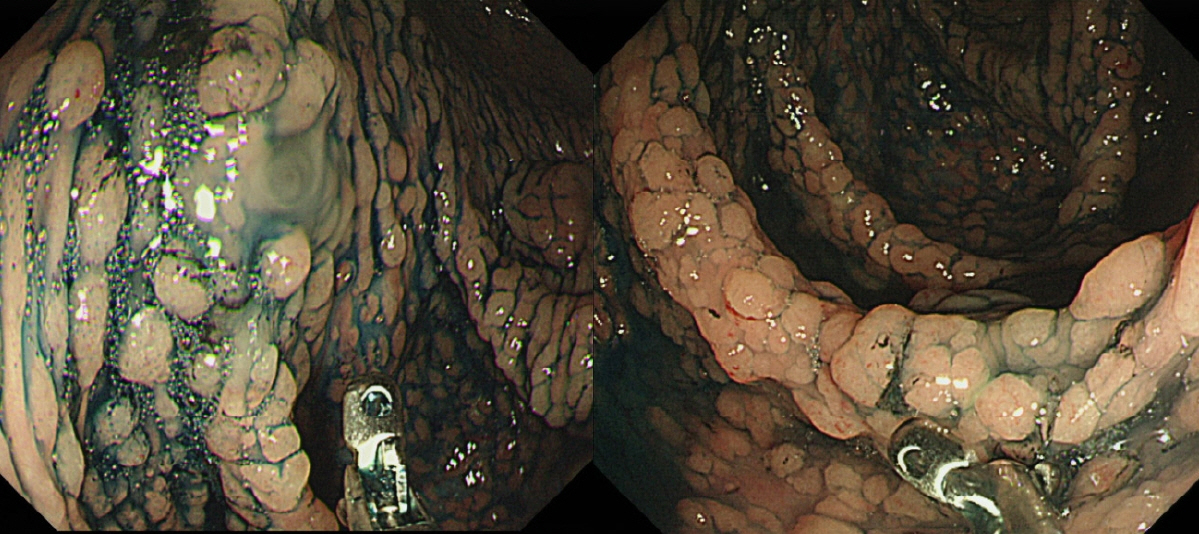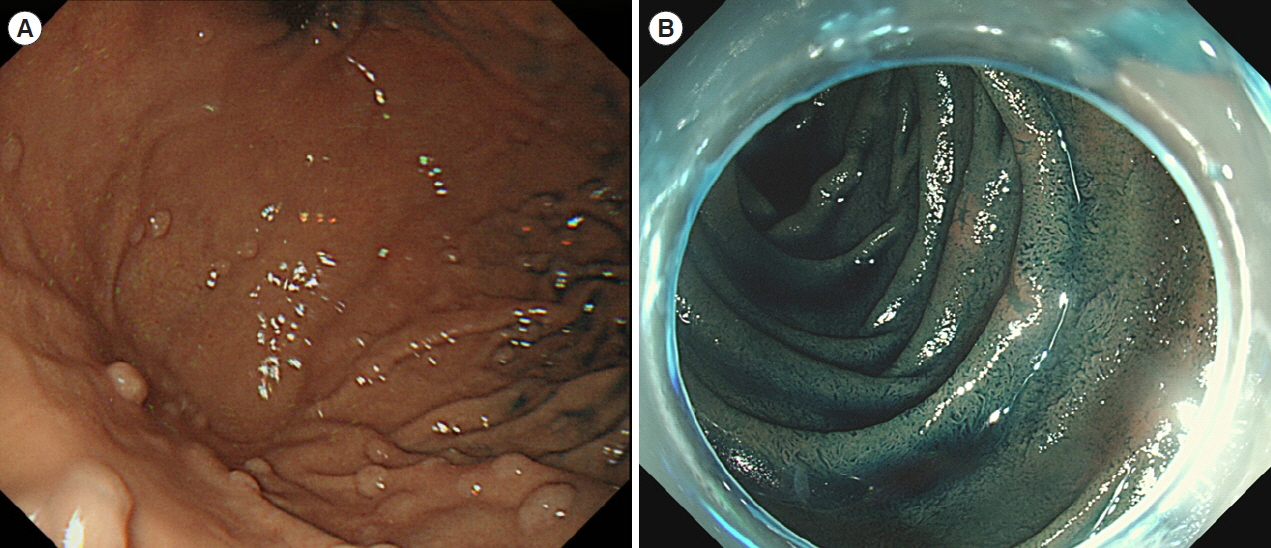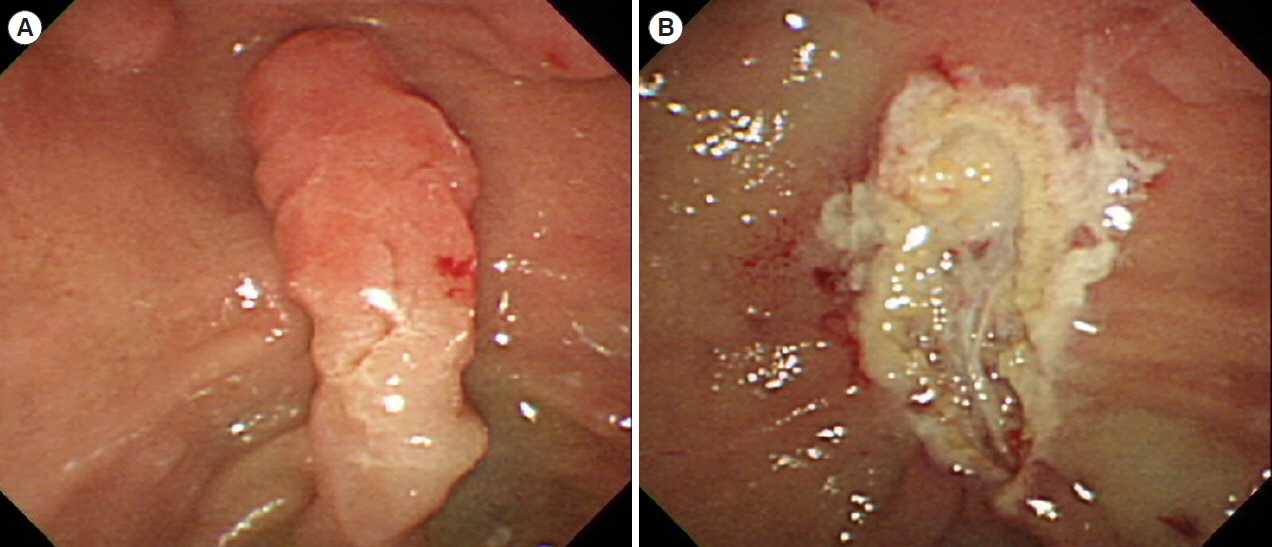Intest Res.
2024 Apr;22(2):119-130. 10.5217/ir.2023.00112.
Screening and surveillance for hereditary colorectal cancer
- Affiliations
-
- 1Cancer Prevention Center, Yonsei Cancer Center, Yonsei University College of Medicine, Seoul, Korea
- 2Division of Gastroenterology, Department of Internal Medicine and Institute of Gastroenterology, Yonsei University College of Medicine, Seoul, Korea
- KMID: 2554657
- DOI: http://doi.org/10.5217/ir.2023.00112
Abstract
- Hereditary colorectal cancer is a type of cancer that is caused by a genetic mutation. Individuals with a family history of colorectal cancer, or who have a known hereditary syndrome, are at an increased risk of developing the disease. Screening and surveillance are important tools for managing the risk of hereditary colorectal cancer. Screening involves a combination of tests that can detect precancerous or cancerous changes in the colon and rectum. Surveillance involves regular follow-up examinations to monitor disease progression and to identify new developments. The frequency and type of screening and surveillance tests may vary depending on an individual’s risk factors, genetic profile, and medical history. However, early detection and treatment of hereditary colorectal cancer can significantly improve patient outcomes and reduce mortality rates. By implementing comprehensive screening and surveillance strategies, healthcare providers can help individuals at risk of hereditary colorectal cancer to receive timely interventions and make informed decisions about their health. Specific examples of screening and surveillance tests for hereditary colorectal cancer include colonoscopy, genetic testing, and imaging tests. In this review article, we will discuss detailed screening and surveillance of hereditary colorectal cancer.
Keyword
Figure
Reference
-
1. Jang J, Park J, Park SJ, Park JJ, Cheon JH, Kim TI. Clinical characteristics and risk factors related to polyposis recurrence and advanced neoplasm development among patients with non-hereditary colorectal polyposis. Intest Res. 2023; 21:510–517.
Article2. Stoffel EM, Boland CR. Genetics and genetic testing in hereditary colorectal cancer. Gastroenterology. 2015; 149:1191–1203.
Article3. Macaron C, Leach BH, Burke CA. Hereditary colorectal cancer syndromes and genetic testing. J Surg Oncol. 2015; 111:103–111.
Article4. Burt RW, Barthel JS, Dunn KB, et al. NCCN clinical practice guidelines in oncology: colorectal cancer screening. J Natl Compr Canc Netw. 2010; 8:8–61.5. Tomita N, Ishida H, Tanakaya K, et al. Japanese Society for Cancer of the Colon and Rectum (JSCCR) guidelines 2020 for the clinical practice of hereditary colorectal cancer. Int J Clin Oncol. 2021; 26:1353–1419.
Article6. Monahan KJ, Bradshaw N, Dolwani S, et al. Guidelines for the management of hereditary colorectal cancer from the British Society of Gastroenterology (BSG)/Association of Coloproctology of Great Britain and Ireland (ACPGBI)/United Kingdom Cancer Genetics Group (UKCGG). Gut. 2020; 69:411–444.7. Stoffel EM, Koeppe E, Everett J, et al. Germline genetic features of young individuals with colorectal cancer. Gastroenterology. 2018; 154:897–905.8. Ahadova A, Seppälä TT, Engel C, et al. The “unnatural” history of colorectal cancer in Lynch syndrome: lessons from colonoscopy surveillance. Int J Cancer. 2021; 148:800–811.9. Park JS, Park JW, Shin S, et al. Application of multigene panel testing in patients with high risk for hereditary colorectal cancer: a descriptive report focused on genotype-phenotype correlation. Dis Colon Rectum. 2022; 65:793–803.10. National Comprehensive Cancer Network. Genetic/Familial High-Risk Assessment: Colorectal (Version 1.2023). Plymouth Meeting: National Comprehensive Cancer Network, 2023.11. Kim B, Won D, Jang M, et al. Next-generation sequencing with comprehensive bioinformatics analysis facilitates somatic mosaic APC gene mutation detection in patients with familial adenomatous polyposis. BMC Med Genomics. 2019; 12:103.
Article12. Kim SY, Kwak MS, Yoon SM, et al. Korean Guidelines for Postpolypectomy Colonoscopic Surveillance: 2022 revised edition. Intest Res. 2023; 21:20–42.
Article13. Jung YS. Summary and comparison of recently updated post-polypectomy surveillance guidelines. Intest Res. 2023; 21:443–451.
Article14. Hong SW, Byeon JS. Endoscopic diagnosis and treatment of early colorectal cancer. Intest Res. 2022; 20:281–290.
Article15. Lynch HT, de la Chapelle A. Hereditary colorectal cancer. N Engl J Med. 2003; 348:919–932.
Article16. Antelo M, Golubicki M, Roca E, et al. Lynch-like syndrome is as frequent as Lynch syndrome in early-onset nonfamilial nonpolyposis colorectal cancer. Int J Cancer. 2019; 145:705–713.
Article17. Ligtenberg MJ, Kuiper RP, Geurts van Kessel A, Hoogerbrugge N. EPCAM deletion carriers constitute a unique subgroup of Lynch syndrome patients. Fam Cancer. 2013; 12:169–174.
Article18. Heald B, Plesec T, Liu X, et al. Implementation of universal microsatellite instability and immunohistochemistry screening for diagnosing lynch syndrome in a large academic medical center. J Clin Oncol. 2013; 31:1336–1340.
Article19. Umar A, Boland CR, Terdiman JP, et al. Revised Bethesda guidelines for hereditary nonpolyposis colorectal cancer (Lynch syndrome) and microsatellite instability. J Natl Cancer Inst. 2004; 96:261–268.20. Vasen HF, Watson P, Mecklin JP, Lynch HT. New clinical criteria for hereditary nonpolyposis colorectal cancer (HNPCC, Lynch syndrome) proposed by the International Collaborative group on HNPCC. Gastroenterology. 1999; 116:1453–1456.
Article21. Syngal S, Fox EA, Eng C, Kolodner RD, Garber JE. Sensitivity and specificity of clinical criteria for hereditary non-polyposis colorectal cancer associated mutations in MSH2 and MLH1. J Med Genet. 2000; 37:641–645.
Article22. Lipton LR, Johnson V, Cummings C, et al. Refining the Amsterdam criteria and Bethesda guidelines: testing algorithms for the prediction of mismatch repair mutation status in the familial cancer clinic. J Clin Oncol. 2004; 22:4934–4943.
Article23. Rodríguez-Moranta F, Castells A, Andreu M, et al. Clinical performance of original and revised Bethesda guidelines for the identification of MSH2/MLH1 gene carriers in patients with newly diagnosed colorectal cancer: proposal of a new and simpler set of recommendations. Am J Gastroenterol. 2006; 101:1104–1111.
Article24. Piñol V, Castells A, Andreu M, et al. Accuracy of revised Bethesda guidelines, microsatellite instability, and immunohistochemistry for the identification of patients with hereditary nonpolyposis colorectal cancer. JAMA. 2005; 293:1986–1994.
Article25. Kuwabara K, Suzuki O, Chika N, et al. Prevalence and molecular characteristics of DNA mismatch repair protein-deficient sebaceous neoplasms and keratoacanthomas in a Japanese hospital-based population. Jpn J Clin Oncol. 2018; 48:514–521.
Article26. Syngal S, Brand RE, Church JM, et al. ACG clinical guideline: genetic testing and management of hereditary gastrointestinal cancer syndromes. Am J Gastroenterol. 2015; 110:223–263.
Article27. Duffy MJ, van Dalen A, Haglund C, et al. Tumour markers in colorectal cancer: European Group on Tumour Markers (EGTM) guidelines for clinical use. Eur J Cancer. 2007; 43:1348–1360.
Article28. Møller P. The Prospective Lynch Syndrome Database reports enable evidence-based personal precision health care. Hered Cancer Clin Pract. 2020; 18:6.
Article29. Schmeler KM, Lynch HT, Chen LM, et al. Prophylactic surgery to reduce the risk of gynecologic cancers in the Lynch syndrome. N Engl J Med. 2006; 354:261–269.
Article30. Curtius K, Gupta S, Boland CR. Review article: Lynch syndrome. A mechanistic and clinical management update. Aliment Pharmacol Ther. 2022; 55:960–977.
Article31. Giglia MD, Chu DI. Familial colorectal cancer: understanding the alphabet soup. Clin Colon Rectal Surg. 2016; 29:185–195.
Article32. Groden J, Thliveris A, Samowitz W, et al. Identification and characterization of the familial adenomatous polyposis coli gene. Cell. 1991; 66:589–600.
Article33. Yang J, Gurudu SR, Koptiuch C, et al. American Society for Gastrointestinal Endoscopy guideline on the role of endoscopy in familial adenomatous polyposis syndromes. Gastrointest Endosc. 2020; 91:963–982.
Article34. Giardiello FM, Allen JI, Axilbund JE, et al. Guidelines on genetic evaluation and management of Lynch syndrome: a consensus statement by the US Multi-Society Task Force on colorectal cancer. Gastroenterology. 2014; 147:502–526.
Article35. Kanth P, Grimmett J, Champine M, Burt R, Samadder NJ. Hereditary colorectal polyposis and cancer syndromes: a primer on diagnosis and management. Am J Gastroenterol. 2017; 112:1509–1525.
Article36. Spigelman AD, Williams CB, Talbot IC, Domizio P, Phillips RK. Upper gastrointestinal cancer in patients with familial adenomatous polyposis. Lancet. 1989; 2:783–785.
Article37. Riedel RF, Agulnik M. Evolving strategies for management of desmoid tumor. Cancer. 2022; 128:3027–3040.
Article
- Full Text Links
- Actions
-
Cited
- CITED
-
- Close
- Share
- Similar articles
-
- Hereditary Colorectal Cancer
- Tailored Surveillance Strategies for Pancreatic Cancer in Patients with Chronic Pancreatitis
- Colorectal Cancer Screening and Surveillance in the Elderly: Updates and Controversies
- Korean National Recommendation Guidelines on Screening and Surveillance for Early Detection of Colorectal Cancers
- Hereditary Colon Cancer: Lynch Syndrome





